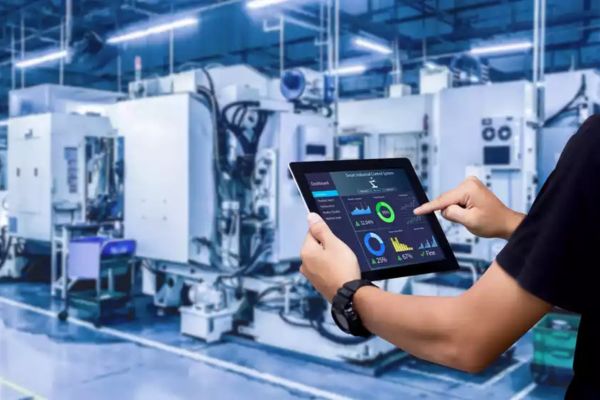The manufacturing sector has been evolving rapidly since recent years and the integration of advanced machine control technologies plays a vital role in driving manufacturing excellence. Advanced machine control technologies play a crucial role in manufacturing sector for facilitating industrial automation, more efficient operations, and reducing human error. Today, manufacturers who adopt advanced machine control technologies can gain significant benefits such as enhanced efficiency, flexibility, profitability, and productivity, which are crucial for strengthening their position in the global marketplace. This article provides a brief description regarding how the integration of advanced machine control technologies in manufacturing sector is improving operational efficiency and productivity.
Understanding Advanced Machine Control Technologies
Machine control technologies involve the utilization of hardware and software systems that can monitor, direct, and optimize the operations of several industrial machinery used in manufacturing environments. Advanced machine control systems can facilitate automated operations, improve manufacturing efficiency & productivity, and enhance the quality of industrial processes by automating repetitive operations. Moreover, advanced machine control technologies often integrate the following elements to ensure manufacturing excellence and productivity:
- Industrial Internet of Things (IIoT): It consists of a wide range of sensors, devices, and machines that are connected through the internet, which enables real-time data capture and communication.
- Machine Learning (ML) and Artificial Intelligence (AI): Artificial intelligence and machine learning algorithms typically learn from data for predicting anomalies, automating decision-making, and optimizing operations.
- Advanced Sensing Technologies and Machine Vision: It includes cameras, sensors, and other aspects for inspecting, aligning, and guiding components with high precision and accuracy.
- Human Machine Interface (HMI): It includes touchscreens and graphical dashboards that facilitate intuitive control and monitoring of machinery used in manufacturing/industrial settings.
- Robotics: It includes flexible automation units that are capable of conducting complex or repetitive tasks in manufacturing facilities.
How Advanced Machine Control Technologies are Enhancing Manufacturing Productivity
- Increased Automation and Throughput
One of the primary benefits of advanced machine control technologies include its ability to facilitate industrial automation. Automating repetitive tasks within manufacturing facilities helps in freeing up human resources for more complex tasks while speeding up production lines. Moreover, advanced machine control technologies can automate complex processes, decrease reliance on human intervention, and minimize manual errors. Similarly, automated production lines can operate constantly, usually at higher speeds and with fewer interruptions, which significantly improves the throughput.
- Real-Time Monitoring and Control
Advanced machine control technologies can constantly monitor and track machine status and process parameters, which enables quick detection and correction of any deviations or anomalies. This results in minimized equipment downtime, fewer defective products, and less wastage. Moreover, real-time monitoring and control enables just-in-time adjustments, which can assist in optimizing the entire production chain and supporting efficient operations.
- Predictive Maintenance
Equipment downtime can significantly impact manufacturing operations, which often leads to costly delays and productivity loss. Advanced machine control technologies, integrated with AI and IIoT sensors, can predict component/equipment failures based on operational data trends and patterns, allowing maintenance teams to address issues before they cause unplanned downtime. Moreover, predictive maintenance helps in minimizing unplanned downtime, prolonging machine lifespan, and reducing maintenance costs.
- Improved Adaptive Control
Machine control technologies offer improved flexibility and often includes modular software and programmable settings, which enable manufacturers to rapidly switch between product variants or reconfigure production lines for different batch sizes and requirements with minimal downtime. Flexibility and adaptability play an essential role for fulfilling the demand for mass customizations that are prevalent in today’s markets.
- Enhanced Quality Control
The integration of machine vision and artificial intelligence with machine control technologies enables faster and more accurate quality control processes. Automated inspection ensures early detection of defects and prevents faulty products from reaching later stages of production or final consumers. Consistent, reliable, and enhanced quality directly leads to higher customer satisfaction and reduced returns or recalls.
Integration and Implementation Challenges
Machine control technologies offer significant benefits, however, there are certain challenges associated with its integration/implementation, which include high initial investments in hardware, software, employee training, along with security solutions as more number of machines become interconnected.
Moreover, the upfront costs associated with setting up machine control system hardware/equipment and software, along with integrating them into existing systems can be considerably high, which may cause financial barriers, specifically for smaller businesses or businesses operating on tighter budgets. Additionally, advanced machine control systems can be quite complex to install and operate, which further necessitates additional expenses on training personnel for ensuring effective implementation.
A successful transition towards the implementation of machine control technologies requires a clear vision, ongoing training, and strong partnerships with technology providers to facilitate seamless operations.
Conclusion
Advanced machine control technologies can transform modern manufacturing and drive operational efficiency, quality, and productivity. By integrating automation, real-time monitoring & control, predictive insights, and enhanced safety features, machine control technologies are expected to revolutionize manufacturing operations and drive productivity. Manufacturers that implement advanced machine control technologies are anticipated to thrive in the rapidly evolving future of manufacturing sector.

















